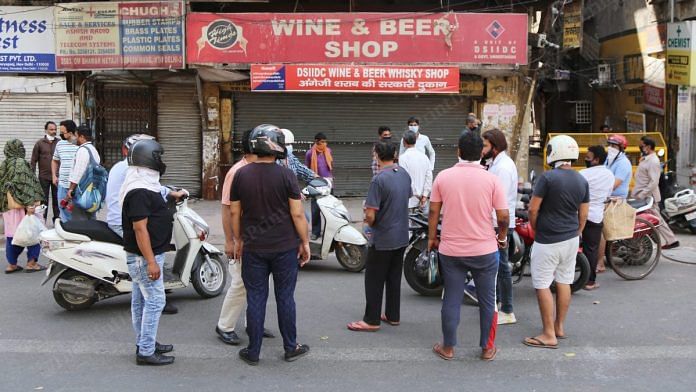Researchers in India trying to understand the alcohol-economy relationship, especially given the chaos over liquor in the Covid-19 lockdown, often hit roadblocks due to the lack of transparency in the financial mechanism of it.
This non-transparency is not new and was in play much before the Covid crisis. As revenues collected from alcohol sales don’t qualify under GST, each state and union territory holds exclusive powers in designing state-specific excise rates and regulating alcohol production and distribution. Each state has different rates of duties — such as excise duties, additional excise duties, special fees, bottling fees, etc. — which are levied on different types of alcohol products such as Indian-Made Foreign Liquor, Country Liquor, or Imported Foreign Liquor. Tax rates not only vary across categories of alcohol products but may vary even within a category across their manufacturing prices.
Excise duty on alcohol accounts for nearly the entire share of excise revenue of most states and for 10-15 per cent on average of the own-tax revenue of most states.
Unfortunately, there is currently no national database that systematically collates and compiles this information.
The responsibility of maintaining the tax figures rests with the respective state excise departments and these are not publicly available. Although this data is under RTI, obtaining these figures requires cutting through a great deal of bureaucratic red tape, including multiple in-person visits to the state departments and seeking several permission letters, which pose significant challenges for researchers in this field.
Also read: Punjab minister says CM’s liquor home delivery move undignified, supports wife’s review call
The state difference
The disparities between India’s states on alcohol are endless. States such as Karnataka and Delhi, among others, levy excise duties on the total volume of liquor, whereas Himachal Pradesh and Madhya Pradesh levy excise duty on alcohol content. There are also discrepancies regarding levying duties as a lump-sum or a percentage of manufacturing costs. Even alcohol distribution models vary from state to state. The Haryana government garners revenue through auctioning liquor vends but the Karnataka government regulates revenue collection through a state-owned distribution company, which is the sole authority for procurement and distribution to retailers of alcohol products in the state. Hence, the mechanisms of price determination, tax rates and tax-price correspondence in these two regimes are significantly different.
Many studies have found alcohol to be tax-inelastic, enabling states to argue that a hike in prices would not only raise revenue but even discourage alcohol consumption. Alcohol is one of the three important things outside the ambit of GST – land and fuel being the others. While GST share accrual to state often faces bureaucratic delays, owing to Centre-state frictions, revenue collection from alcohol faces no such hurdles.
Also read: After 40 days of lockdown, Indians just wanted alcohol not ‘Gujarat Model’
We need better alcohol data
The multiple layers of data constraints — ranging from unavailability of public data to lack of standardisation across states — makes it difficult to undertake comprehensive public policy research on alcohol in India. Given the role that alcohol taxation plays in increasing revenue prospects for states, studying alcohol taxation is important.
Creating easy access to the data is a low-hanging fruit that can generate quick, relevant, and important results for state governments to raise revenue in the short-run. Studying the variation in alcohol taxation and distribution models will also bring to focus best practices that states may consider following over the medium to long-term.
The unprecedented lockdown to control the spread of the coronavirus has saved thousands of lives but brought the onset of another unprecedented event — the probability of a severe economic contraction. This may lead to governments using all methods to raise revenues for a fiscal stimulus, including reaping benefits from alcohol taxation. What remains critical now, from a research perspective, is to take the opportunity to evaluate best-practices in alcohol-related revenue generation and, overall, to ensure the health and safety of Indians during the biggest threat to our collective well-being.
The authors are Associate Fellows at the National Council of Applied Economic Research. Views are personal.




The article was something of an eye opener but ending was all too abrupt. Expectation was there to have some strong recommendations for immediate action since your readership would indeed comprise of influencers and decision makers who can bring about change in possibly removing the opacity, ensuring some amount of standardization across states and also in creating the required national database while still respecting the states choice in means of handling delivery and pricing.
I hope you realize the power of your medium which is possibly the only available means in this country to credibly influence public opinion and public policy. Indeed every article here has to be hard hitting and definitive since this is not a frivilous newspaper or news channel. I believe The Print means business. Expectations are for very high standards.